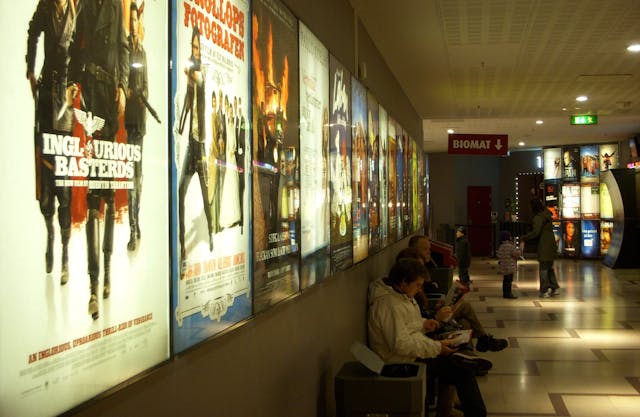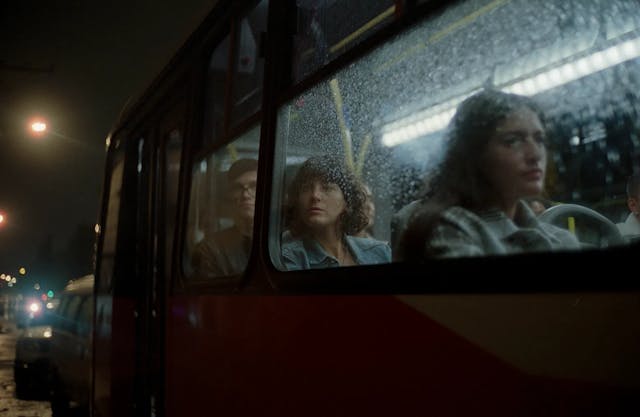Oscars 2024: Who Should Win the Best Documentary Short Film Academy Award

Co-directors Ben Proudfoot and Kris Bowers at the Oscar Nominee Luncheon. They are our faves to win Best Documentary Short Film on March 10, 2024. / Photo by Mike Baker, courtesy of A.M.P.A.S.
This year's Best Documentary Short Oscar competition is a mixed bag, but there is a clear winner. Sure, I have said the same thing before just to be trumped by the wise members of the Academy. As luck would have it, the one I see as the weakest is the one with more accolades from film festivals - read on to find out which one it is -. Still, I venture you will feel the same thing once you see the five short docs nominated.
Some can work as case studies of social issues. Their pressing urgency of the problems they contemplate pass for cinematic quality. Audiences - and critics, natch! - tend to confuse cinematic quality with the perceived importance of the documentary's subject. We also fall for how close they happen to be to our own system of beliefs. It's the equivalent of awards going to actors nominated for playing the character who suffers the most out of the five nominees.
The good news is that this year, it's relatively easy to see all five nominees, compare them, and make up your mind. You can catch them all in theaters, thanks to the ShortsTV branded screenings playing nationwide. It is our preferred option. It is a rare privilege to see documentaries like these on the big screen. If, for any reason, that's not possible for you, most of them can be seen for free online. We include links when available after each short review of the contenders. Movie buff, there is no excuse to arrive at Oscar night clueless about this low-profile, but meaty category.
The ABCs of Book Banning
The wave of conservatives waging a cultural war against books finds a charming retort in this documentary by the trio of Sheila Nevins, Trish Adlesic, and Hazenet Habtezghi. We get assorted grade schoolers, in groups or alone, commenting on some books banned from their school libraries. The kids are charming, but the movie has the vibe of a very special episode of "Kids Say the Darndest Things." It rides on cuteness. A few writers are called in, but some are reduced to merely announcing their name and the title of the forbidden work, like Peter Parnell and Justin Richardson, authors of the gay penguin dad classic "…and Tango Makes Three." And yes, dear reader, in nature, male penguins couple up and raise chicks on their own. Perhaps if they read a bit, the members of the anti-books brigade would know it.

10-year-old Taylor schools the grownups on "The ABCs of Book Banning" / Photo courtesy of ShortsTV.
Favoring the kids goes in line with the progressive stance to let them weigh in on the subjects that affect them directly instead of imposing the traditional power dynamic of adults deciding for them - check out the German Best Foreign Film nominated "The Teacher's Lounge" to see the dynamic at play in a fictional and kafkian key -. As articulate as the kids can be, it strikes a repetitive note. You wish a more journalistic approach would have dug deeper into the issue.
You can watch "The ABCs of Book Banning" streaming at Paramount+ or free on its YouTube channel.
The Barber of Little Rock
A compelling, if schematic, look at the fight for economic justice in the black community of Arkansas. Arlo Washington is a professional barber with a mission beyond providing customers with a mean fade. Inspired by the memory of his mother and his own struggle to prosper, he works for his community in meaningful ways. First, he opened a hair styling school to provide ex-convicts and at-risk people with valuable work skills. Second, he founded People's Trust, a credit union to serve the black community traditionally neglected by commercial banking. It's not a common financial operation. It gives loans to those banks don't even consider as credit subjects, and offers emergency grants to keep people out of homelessness.

Man of the people: Arlo Washington is much more than "The Barber of Little Rock" / Photo courtesy of ShortsTV.
This is a complex social issue compounded by institutional racism. We meet people from all walks of life as they visit the People's Trust office, which allows the viewer to recognize the humanity of people disfranchised by the financial system. To offer subtext, directors Jonathan Hoffman and Christine Tuner pepper the narrative with stark data. It might be necessary, but the frames of white text on a black background hinder the rhythm of the narrative and give the documentary the feel of an institutional video.
You can watch "The Barber of Little Rock" on The New Yorker YouTube channel.
Island in Between
Taiwanese-American filmmaker S. Leo Chiang returns to his roots for a human-scale consideration of the cultural no-man's land inhabited by Taiwanese citizens in the shadow of an ever-encroaching China. The symbolic vortex of identity crisis is the Kinmen Islands, a couple of islands so close to the mainland that from their shores, you can see the towering buildings of the city of Xiamen, province of Fujian. Taiwan, which counts them as part of its territory, is 116 miles to the east.

Far away, so close: Taiwanese citizens of Kinmen Islands live in the shade of the Chinese mainland in "Island in Between" / Photo courtesy of ShortsTV.
The intricacies of geopolitics take a backseat to considerations of identity and kinship in a pseudo-autobiographical and anthropological audiovisual essay. There is an offhand, improvised feeling of the proceedings as Chiang jumps from detached observation of the environment to personal remembrance. The movie is somewhat shapeless, but it piques your interest enough to wish it were longer and better.
You can watch Island in Between on the New York Times YouTube channel.
The Last Repair Shop
"The Last Repair Shop" stands head and shoulders above the competition. It may seem unfair. Kris Bowers and Ben Proudfoot's work benefits from a higher budget and first-rate production values, but its biggest asset is its novel-like approach to narrative. The title announces that the movie will focus on the last repair shop that tends to the musical instruments high school students use in Los Angeles. You settle in for an issues-driven narrative, but then, the movie opens up, exploring the lives of the dedicated employees, making it possible for the kiddies to keep playing.
The scope of human experience portrayed can leave you breathless. There's Dana Atkinson, a gay man who has survived homophobia and the AIDS era; Patty Moreno, a Mexican immigrant who crossed the border looking for a better life for her and her children; Duane Michaels, a good old boy who brushed with fame and fortune in his own career as a country musician. They all work under the leadership of Steve Bagmanyan, an Armenian immigrant who found freedom, a new family, and a reaffirmation of his musical calling in a new land.

The rhythm is going to get you: a young violinist makes beautiful music thanks to "The Last Repair Shop" / Photo courtesy of ShortsTV.
"The Last Repair Shop" vindicates the need for musical education but also portrays the melting pot of the United States at its best. It connects with the most urgent issue of the current political debate. In Patty and Steve, we see the human faces of migration, whether looking for economic security or fleeing life-threatening political unrest. You understand how much migrants can contribute to the country while the new generation benefits from their efforts. This symphony of humanity gets a beautiful soundtrack from the kids. The movie closes with a marvelous orchestral performance that unites the technicians with generations of young and adult musicians who have benefited from their efforts. Keep your handkerchief close, and campaign for funding for school bands at your next PTA meeting. It's the most American thing you can do.
Watch The Last Repair Shop on the Los Angeles Times YouTube channel.
Nai Nai and Wai Po
This is a glorified home movie full of wasted possibilities. Filmmaker Sean Wang observes his two grandmothers accompanying each other in old age. They are congenial, as the best of sisters, and even sleep in the same bed - much merriment is mined from a farting episode. The camera follows them through their routine as they comment on their lives in voice-over. Pictures and snippets of home movies ground their reveries of the past. We never see anybody else in the house except for a blink-and-you'll-miss peek at their grandson. They don't live alone, not really. Nai takes pride in cleaning and arranging a lot of shoes deposited in the garage - even if you account for the crew, there seem to be many people around.

More than a century of love and experience: Yi Yan Fuei and Zhang Li Hua are "Nai Nai and Wai Po" / Photo courtesy of ShortsTV.
This mystery pales in comparison to the assertion that the women have not left the house for over a year. Is it because of the Pandemic? Or perhaps the wave of racist attacks against elderly Asian-American citizens? If you are tuned in to the news, it turns your stomach into knots. When Mai Mai says they like to dance, you just think of the mass shooting at the dance studio in California. We can't fault the filmmaker for dereliction of duty. Maybe he is committed to the practice of observational cinema. But then again, what's with the self-consciously wacky sequence where the grannies play dress up and vamp for the camera? It's easy to see why Disney+ is streaming the short. This is a cute but inconsequential look at growing old.
Winner of the Grand Jury Prize at the 2023 AFI Fest, and the Short Film Award at the 2023 Seattle International Film Festival. “Nai Nai and Wai po” is streaming on Disney+
Want to get an email when we publish new content?
Subscribe today



























